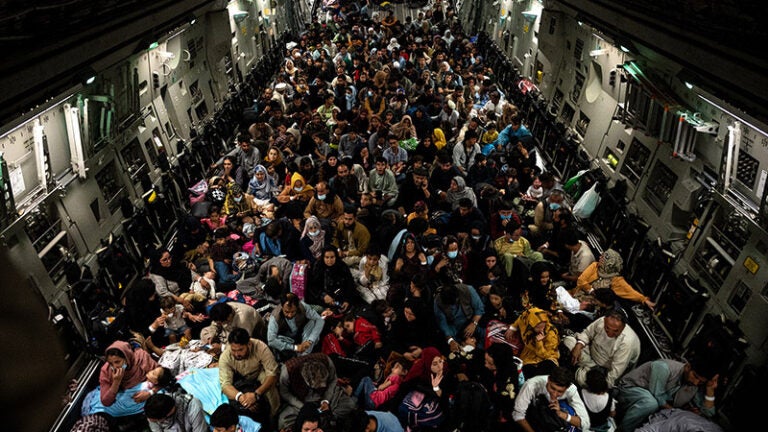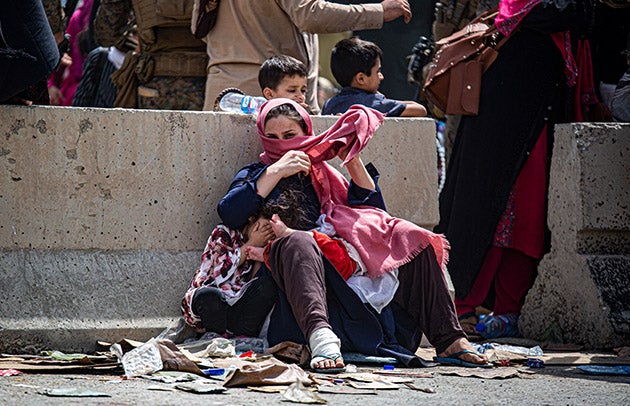
USC Dornsife experts assess the situation in Afghanistan
It’s hard not to be deeply saddened at the heartbreaking images of desperate Afghans trying to flee their country as the Taliban resume control.
Two experts on the region from the USC Dornsife College of Letters, Arts and Sciences — Robert English, associate professor of international relations, Slavic languages and literature and environmental studies, and Steve Swerdlow, associate professor of the practice of political science and international relations — answer five questions about the Taliban, the fall of Afghanistan and the challenges ahead.
Kabul’s rapid fall came as a shock to many. Why were the Taliban able to sweep to power so rapidly?
English: I would repeat what I said 20 years ago when I drew on the Soviet experience to warn about three things on the eve of the U.S. invasion: first, the Afghan people are fierce fighters who resist any foreign occupiers, even those who see themselves as liberators; second, Afghanistan is not a united nation, rather a patchwork of diverse ethnicities and tribes that will be extremely difficult to reform; third, our stated goals of combatting religious fundamentalism while promoting economic development and women’s rights sounded eerily similar to the Soviets’ goals in 1979 — and so might also be rejected by many as foreign imports alien to traditional Afghan culture.
Afghanistan is very different today than under the first period of Taliban rule. What do you think Afghanistan will look like under a second bout of Taliban control?
Swerdlow: Afghan society certainly experienced extraordinary changes over the last 20 years in terms of the growth of a civil society and media and the assertion of initiatives to empower women and girls in ways that were impossible under the Taliban. The question now becomes, “What tools do the U.S. and its allies have to pressure the Taliban to respect basic human rights commitments?”
Is the U.S. government’s approach to getting at-risk Afghans safely out of Afghanistan sufficient?

The return to power of the Taliban in Afghanistan threatens the human and civil rights of women and girls in the country. (Image Source: U.S. Marine Corps / 1st Lt. Mark Andries.)
Swerdlow: Many problems plague the U.S. effort to evacuate at-risk Afghans. Since the Special Immigrant Visa program opened in 2009 for Afghan translators, interpreters and others who have assisted the U.S. and NATO war effort, it has been mired in bureaucratic problems. Hundreds of Afghan translators and other staff have received repeated rejections of their paperwork despite being vouched for by multiple former military and others. But there’s a much larger category of Afghan citizens with credible claims of persecution under the Taliban, including women leaders, NGO activists, human rights defenders, Afghan government employees and foreign embassy staff, AID workers, and journalists. These people invested years, sometimes decades, into building a civil society and now top the Taliban’s target list. The U.S. and other governments must step up their processing at Kabul airport, but also press the Taliban to halt its repression and urge all Afghanistan’s neighbors to keep their borders open for refugee processing. Anyone who fears persecution should be able to leave and to do so safely.
The Taliban are presenting themselves as peaceful and inclusive. Can women trust this apparent rebranding?
Swerdlow: Aside from some increased savvy in the use of social media, not much has changed. The reality for Afghanistan’s women and girls is grave and desperate. When the Taliban ruled the country from 1996 to 2001, they banned almost all education for women and girls, imposed stoning, lashing and amputation as criminal punishment, and confined women to their homes unless they were escorted by a male family member. Now, seeking to appear acceptable to the international community, Taliban leaders’ rhetoric about women’s rights has slightly softened. But evidence from human rights activists demonstrates that this rhetoric rings hollow. In recent months, as the Taliban advanced, there have been disturbing reports of the closure of girls’ schools, expulsions of women from places of work and restrictions on their movement. The United Nations Human Rights Council, a body that exists solely to monitor and uphold human rights, should immediately authorize and adopt the most robust mechanism it can to monitor closely the Taliban’s conduct, especially in relations to the most vulnerable categories of Afghans — women, children, religious and ethnic minorities, civil society and journalists.
English: The central Taliban leadership may pursue more moderate policies than before on matters such as women’s rights, but they may not be able to control more orthodox and zealous regional officials. I worry that the recriminations that have enveloped Washington will undermine our ability to exert any moderating influence in Afghanistan. A policy that seeks to spite and isolate the Taliban will not encourage moderates. America’s historic tendency after backing the losing side in a civil war — from Russia in 1921 to China in 1949 and Vietnam in 1975 — is precisely spite and isolation. And this has always backfired. We need to put our anger and partisanship aside and work with our European allies, as well as Russia and Pakistan, to engage with the considerable carrots and sticks at our disposal.
Is America’s original war aim — to prevent Afghanistan becoming a launching pad for al-Qaida attacks — now at risk?
Swerdlow: Threats from al-Qaeda and ISIS in Afghanistan will continue to plague regional and global security, and the loss of an embassy will compromise Washington’s ability to collect intelligence. This is why principled engagement and creative diplomacy and pressure with Afghanistan and its neighbors should be utilized long after the last U.S. military jets have departed Kabul airport.